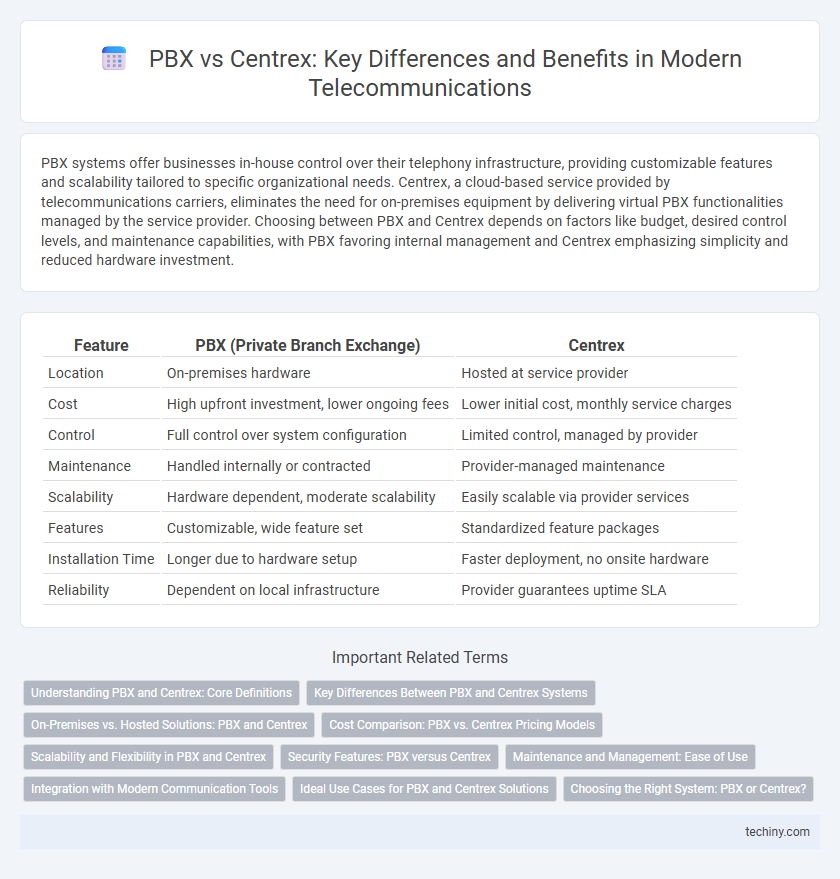PBX systems offer businesses in-house control over their telephony infrastructure, providing customizable features and scalability tailored to specific organizational needs. Centrex, a cloud-based service provided by telecommunications carriers, eliminates the need for on-premises equipment by delivering virtual PBX functionalities managed by the service provider. Choosing between PBX and Centrex depends on factors like budget, desired control levels, and maintenance capabilities, with PBX favoring internal management and Centrex emphasizing simplicity and reduced hardware investment.
Table of Comparison
| Feature | PBX (Private Branch Exchange) | Centrex |
|---|---|---|
| Location | On-premises hardware | Hosted at service provider |
| Cost | High upfront investment, lower ongoing fees | Lower initial cost, monthly service charges |
| Control | Full control over system configuration | Limited control, managed by provider |
| Maintenance | Handled internally or contracted | Provider-managed maintenance |
| Scalability | Hardware dependent, moderate scalability | Easily scalable via provider services |
| Features | Customizable, wide feature set | Standardized feature packages |
| Installation Time | Longer due to hardware setup | Faster deployment, no onsite hardware |
| Reliability | Dependent on local infrastructure | Provider guarantees uptime SLA |
Understanding PBX and Centrex: Core Definitions
PBX (Private Branch Exchange) is a private telephone network used within an organization that manages internal calls and connects to the public switched telephone network (PSTN). Centrex (Central Exchange) is a service provided by telecommunications carriers where the switching equipment is housed at the provider's central office, offering similar functionalities to PBX without on-premises hardware. Understanding the core definitions highlights that PBX offers more control and customization for enterprises, while Centrex delivers managed services with lower upfront costs and simplified maintenance.
Key Differences Between PBX and Centrex Systems
PBX systems are on-premises telephony solutions that offer businesses direct control over call management, hardware, and customization, while Centrex systems are hosted by service providers and eliminate the need for internal equipment maintenance. PBX requires upfront capital investment and technical expertise for installation and upgrades, whereas Centrex operates on a subscription basis with provider-managed infrastructure, facilitating scalability and easier system updates. Call routing flexibility, feature customization, and total cost of ownership are primary factors differentiating PBX from Centrex in enterprise telecommunications environments.
On-Premises vs. Hosted Solutions: PBX and Centrex
PBX systems are on-premises solutions offering businesses direct control over hardware and customization, typically requiring higher upfront investment and ongoing maintenance. Centrex provides hosted telecom services managed by the service provider, reducing capital expenditure and simplifying scalability while relying on external infrastructure. Choosing between PBX and Centrex hinges on factors like desired control level, budget constraints, and IT resource availability.
Cost Comparison: PBX vs. Centrex Pricing Models
PBX systems require significant upfront investment in hardware, installation, and maintenance, leading to higher initial costs but lower ongoing fees. Centrex operates on a subscription-based pricing model with predictable monthly charges that include equipment, maintenance, and support, reducing capital expenditure. Businesses weighing cost considerations should evaluate usage volume, scalability needs, and long-term financial impact to determine the most cost-effective telecommunications solution.
Scalability and Flexibility in PBX and Centrex
PBX systems offer significant scalability and flexibility by allowing organizations to customize features and easily add or remove lines as business needs evolve, supporting both on-premises and cloud options. Centrex services provide scalability through cloud-based infrastructure managed by the service provider, enabling quick expansion without physical equipment changes but with limited customization compared to PBX. Businesses requiring tailored configurations and control often prefer PBX for its adaptability, while those seeking less maintenance and straightforward scalability opt for Centrex.
Security Features: PBX versus Centrex
PBX systems offer enhanced security features by allowing organizations to implement customized firewall settings, call encryption, and internal network isolation, reducing the risk of external cyber threats. Centrex relies on the service provider's infrastructure, which may limit direct control over security protocols and increase potential vulnerability to centralized attacks. Enterprises prioritizing stringent security typically prefer PBX for its greater control over access management and data protection.
Maintenance and Management: Ease of Use
PBX systems require on-site maintenance and technical expertise, offering businesses full control over management and customization. Centrex eliminates the need for on-premises equipment, easing maintenance responsibilities as the service provider handles system updates and troubleshooting. Centrex's cloud-based management interface provides user-friendly tools, making it easier for non-technical staff to manage telephony functions compared to traditional PBX systems.
Integration with Modern Communication Tools
PBX systems offer extensive integration capabilities with modern communication tools such as VoIP, CRM software, and unified communications platforms, enabling seamless collaboration and enhanced workflow efficiency. Centrex services, managed by telecommunications providers, typically provide standardized integration options but may lack the customization and flexibility found in on-premises PBX solutions. Organizations seeking tailored integration with advanced communication features often prefer PBX for its scalability and control over interoperability.
Ideal Use Cases for PBX and Centrex Solutions
PBX systems are ideal for businesses seeking complete control over telecom infrastructure, enabling customization and integration with existing IT networks while minimizing ongoing service fees. Centrex solutions suit organizations preferring outsourced management, scalable line provisioning, and reduced on-premises equipment maintenance, often beneficial for businesses with multiple dispersed locations. Enterprises requiring enhanced security and tailored communication features typically opt for PBX, while those prioritizing ease of deployment and predictable costs favor Centrex.
Choosing the Right System: PBX or Centrex?
Choosing between PBX and Centrex hinges on factors such as control, cost, and scalability; PBX offers on-premises management and customization, ideal for businesses seeking autonomy and advanced features. Centrex provides a hosted solution with lower upfront investment and simplified maintenance, suited for organizations preferring outsourced telecommunications. Evaluating your company's size, growth expectations, and technical resources ensures selecting the right system optimizes communication efficiency and reduces operational expenses.
PBX vs Centrex Infographic

 techiny.com
techiny.com